In my last article, I reviewed the first half of Our Flag Means Death Season two episode four, “Fun and Games”. In a quick summary of this episode, the crew of The Revenge kicks Ed off the ship and Stede, along with his crewmate Buttons, follows Ed off the ship. Ed runs into his friend Mary and Stede runs into Ed’s other friend, Anne. When Mary brings Ed to Anne, passive aggressive chaos ensues with Ed doing his best to shrug off Stede while Stede treads lightly in an attempt to win Ed back. Anne and Mary have a knack for stirring the pot, and they prod the pair on how they met, separating Stede from Ed to get his story on why he left Ed at the docks. At dinner, Anne immediately throws out that Stede ran off to his ex-wife before he had even gotten a chance to tell Ed himself. Ed, shocked and hurt, stands up and storms out of the room. Stede hurries after him and they are finally forced to talk through their feelings.
Picking up from where we left off:
The next scene is possibly one of my favorites in the entire show; the beginning of Ed and Stede’s forgiveness arc. After an episode of exasperatedly screaming “just talk to each other!” at the screen, we finally get that. This conversation highlights the flaws of Ed and Stede, acknowledging they both have issues they need to sort through and have made mistakes. So, let’s go through it.
Of course, the first issue is this: Ed’s fear of vulnerability and how Stede has deepened that wound. As a knee-jerk reaction, Ed immediately tells Stede to go away, that he doesn’t want to talk, and that he happily blames Stede. When Stede says it’s not fair, Ed lashes out about how Stede can’t talk about the idea of “fair” because it wasn’t fair for Stede to abandon Ed either. He claims he’s an idiot saying, “I trusted you. I trusted us”. This dives into Ed’s issues with connection. Ed is always afraid to show his true self to someone in fear that they will react poorly and hurt him in return. He feels he needs to be perfect to be loved. Stede abandoning Ed reinforced these internal battles in Ed that make him think that he is unlovable. Ed put all of himself out there and wore his heart openly on his sleeve. In return, Stede left without a trace. Taika Waititi, the man who plays Ed, touches on this insecurity of Ed’s in an interview with co-star Leslie Jones (who plays Spanish Jackie) on Comedy Central’s The Daily Show, saying “when tough guys say things like ‘never let anyone get too close’ and ‘never fall in love’, that’s because they have a tendency to let people get too close, and want to get close, and are suckers for love”. Ed doesn’t want to let Stede back in because he knows he will fall just as hard and he is afraid to get hurt again. That is his flaw.
Next, Ed makes a point that will remain a focus for the rest of the series. “But I was just a whim. Yeah, I was just a whim to you! Another okay thing like your fancy toy unicorn boat and your wife,” to which Stede rebuts, “I was a whim to you” recounting how Ed was initially going to discard Stede and steal his identity for a short period of time before he fell in love with Stede.
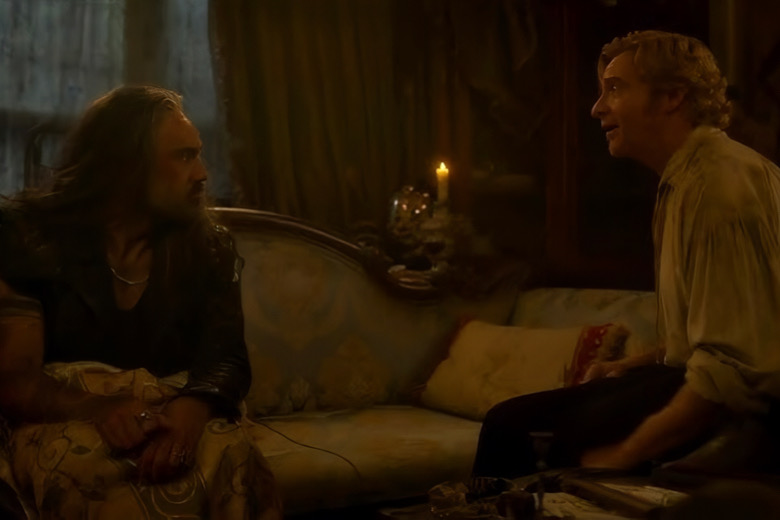
“We were moving so fast,” Stede says, followed by one of my favorite lines, “We’re both whim-prone. Two people prone to whims shouldn’t just run off to China.”
Ed and Stede grew tired of their old lives, and in seeing each other, they found a new life that they had never seen before. They found this life and jumped in headfirst, desperate to keep the joy of it forever and sure that there would be no consequences. Their tendency to be “whim-prone” is both of their flaws. They wanted something so badly they ignored the vital steps of keeping it together and the consequences of that lack of action. There is an inherent romanticism to whims like Ed and Stede’s, running away from their old lives together specifically. But is there logic to it? Is it the right decision? Just because it sounds good now, does that mean they are ready? Ed and Stede are forced to recognize that love is more than jumpstart ideas, but rather careful consideration and patience. What better example of this than Anne and Mary? The entire time we see them, their goal is to stir up trouble. They have no regard for anyone and yes, there is a thrill in what they do. But when that thrill of impulse and lust is over, they are left in a burning home angry and confused. Anne and Mary represent what Ed and Stede will become if they keep following their whims and burying their emotions. Anne and Mary do clearly love each other, but there’s a strain on them because of their inability to communicate and their dependence on compulsion. They know what the other likes and what thrills them, but only because they are always causing fights where the truth comes out instead of saying it on their own fruition. In fact, in this exact scene Stede’s impulse to run has started a fight where they’re forced to openly communicate. The way they handle it, however, isn’t through more impulses like Anne and Mary, but rather communication.
Ed: I was all in, mate. I was all in.
Stede: (sighs) I panicked. Then you shaved your beard off, for me, and-
Ed: Again with the beard. I’m sorry if my horrible naked chin disgusts you so much-
Stede: I love your chin. Naked or otherwise.
Here, we see a realization slowly cross Ed’s face as tears gather in his tired eyes. He’s tired of hurting, he’s tired of anger. He just wants to love and be loved
Stede: I love-
Ed: No, don’t. You don’t get to say that to me.
Stede: I love everything about you. You don’t have to say it back to me.
Ed: I’m not about to.
Stede: I love being near you. It’s nice. It feels good. Breathing the same air.
Ed sets a boundary, and instead of fighting, Stede respects it. He changes course on his admission of love, emphasizing that Ed does not need to say it back to him. When Ed says he won’t, Stede isn’t angry and he understands. Ed and Stede don’t want to operate off whims this time, they want to move at their own pace. As Stede finishes what he says, Ed looks over with a wobbly, hopeful smile, showing that he has given in.
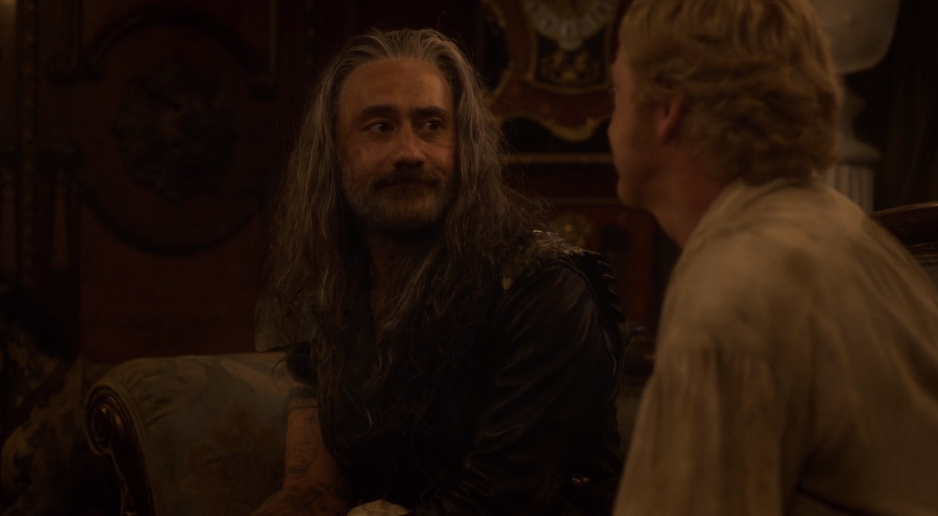
Anne and Mary display once more what Ed and Stede could be if they follow in their steps, mocking the communication between the two of them (“oh my god it was so f[******] earnest!”). Ed says he’s not surprised by Anne, but he doesn’t know what happened to Mary and she responds “we moved to a […] swamp to sell antiques to […] no one! We get our fun where we can!”. Immediately, Anne yells “we can leave any time!”, and they argue. Anne says they don’t leave only because Mary is scared she’s too old to go back to being a pirate. Mary calls Anne something Anne’s obviously told her Mary to call her, making Anne scream and run out as Mary yells at the cuckoo clock that sounds when Anne slams the door. After this Mary has the gall to say, “Me and Annie? We’re what an adult relationship looks like!”, only for the house to fill with smoke and Anne to run in, admitting she lit the house ablaze and suggesting that she and Mary can run away together… again. They embrace each other lovingly, as if having solved a big fight, while Ed and Stede flee the scene.
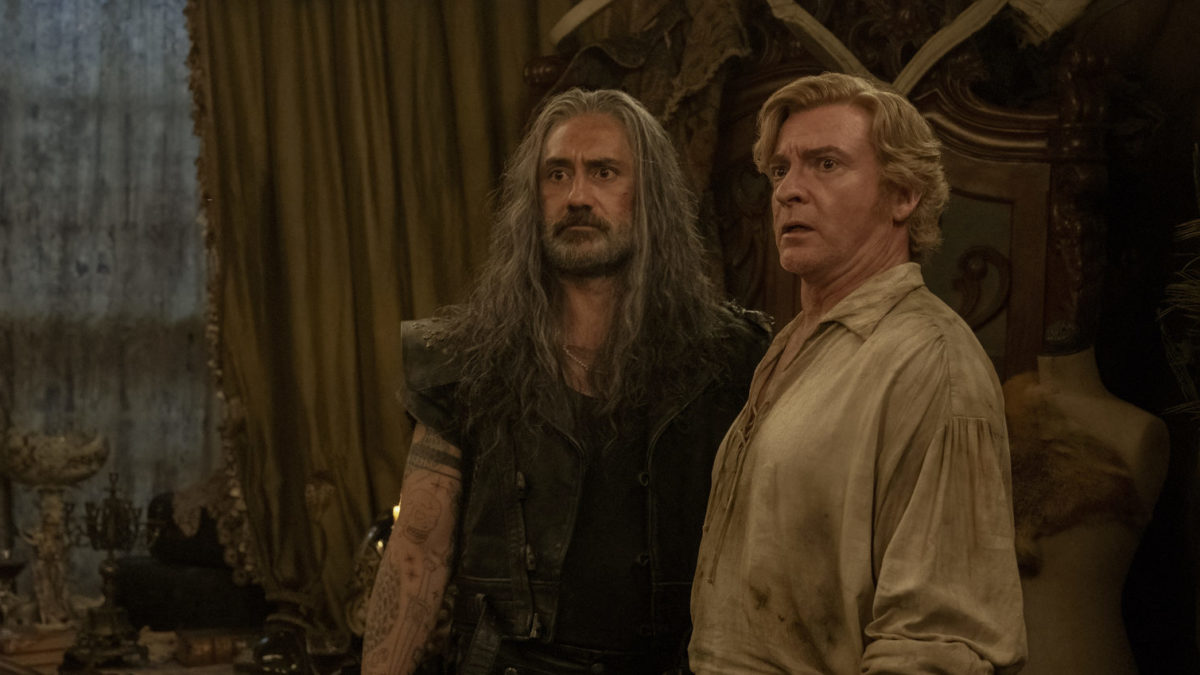
Walking back, Stede offers to ask the crew to allow Ed to spend another night on The Revenge. When Ed says yes, Stede excitedly runs off into the brush to find the ship. Ed, despite still trying to come off cool (now without the passive aggression and pettiness), smiles at him running off.
Buttons snaps Ed out of his adoring gaze with his usual nonsensical rambling. He makes Ed hold his sage as he does a ritual he believes will turn him into a seagull. As he steps into the trees, Ed wipes his face and laments, “Buttons, people don’t change. Not into birds or otherwise.” As soon as he says this, Buttons disappears, Ed walking over to find a seagull where he once stood. He flies away and no sooner does Stede emerge from the brush, saying he has gotten lost and wants Ed’s help. Ed thinks on it momentarily, before a smile crosses his face and he agrees, bounding after Stede with more joy than has been seen on screen from Ed since episode nine of season one.
This scene is the closest we can get to a literal metaphor. Ed says people don’t change, and Buttons literally changes into a bird. I like the specific choice of words used here. It’s not “people never change”, insinuating people are incapable of change, it’s “people don’t change.” People have the ability to change but they rarely take it. After being shown Button’s change, we see Stede come back for Ed unlike what he did before. It’s of my personal beliefs that Stede was not truly lost, or at least that wasn’t why he came back. He came back because he thought about how he left Ed alone, just as he did on that fateful night, and he does not want Ed to believe that he has left again. Regardless, when Stede returns, he is proving to Ed that even emotionally, people change. Stede has displayed momentous growth and change, and maybe for the first time in his life, Ed truly believes people can change because Stede stands before him and Buttons soars into the clouds. He recognizes that he was hurt, but he’s willing to try again. A love like theirs is too precious to let go, and Ed wants to salvage it. This is not Ed forgiving Stede or his embrace of Stede, but it is Ed deciding to give things one last shot, finally imbued with hope for once.
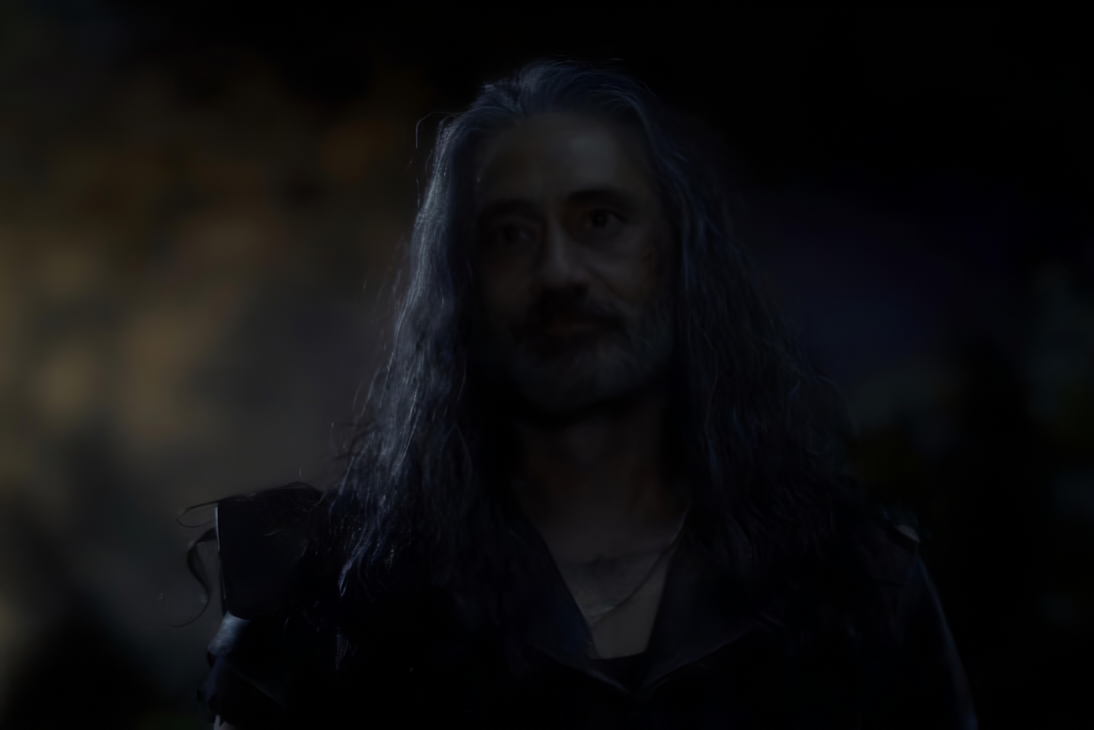
While there’s much left unsaid about Fun and Games, especially regarding the crew’s subplot which I didn’t even touch on, but there’s so much content here already, so I’ll leave it there. Next time we’ll dive into episode five, including the moon, Macbeth, the color red, repairing the revenge, and more!


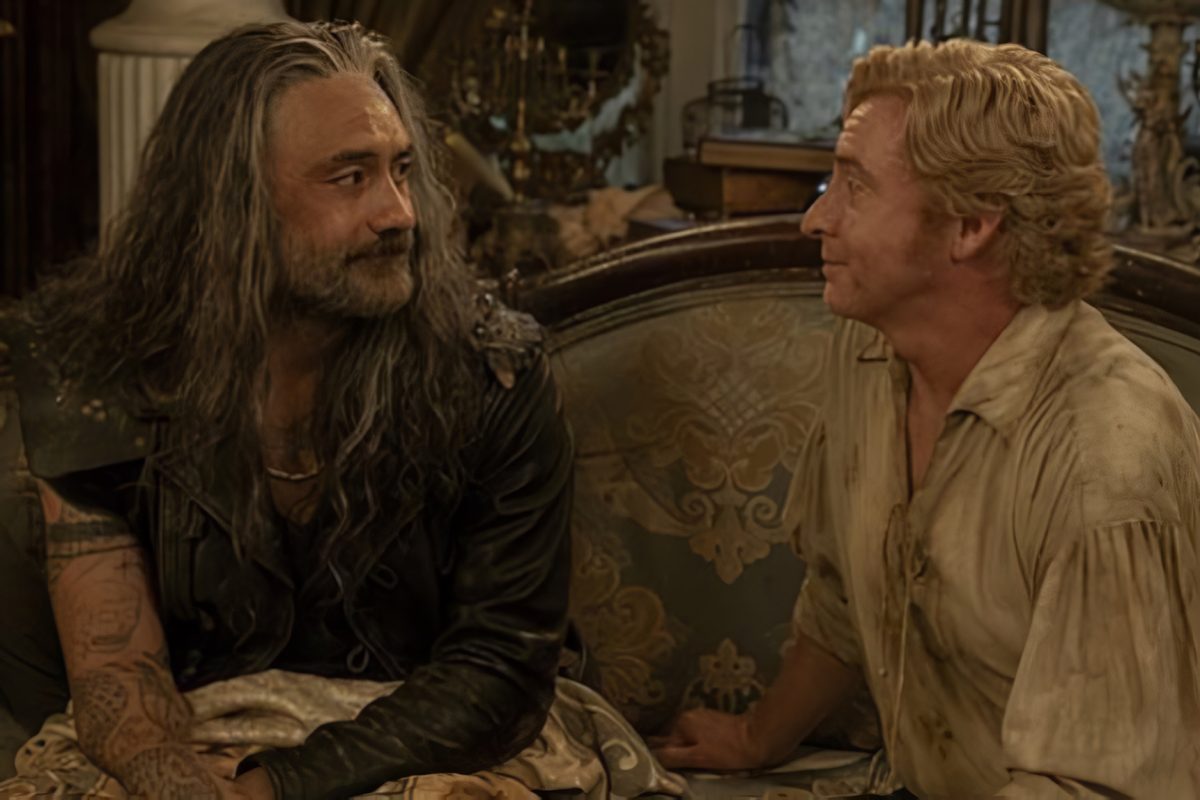





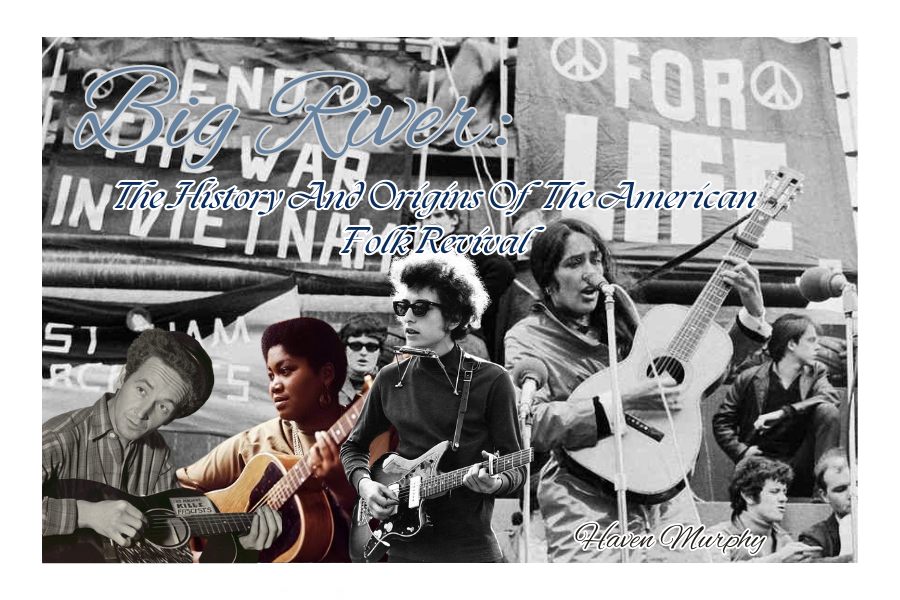
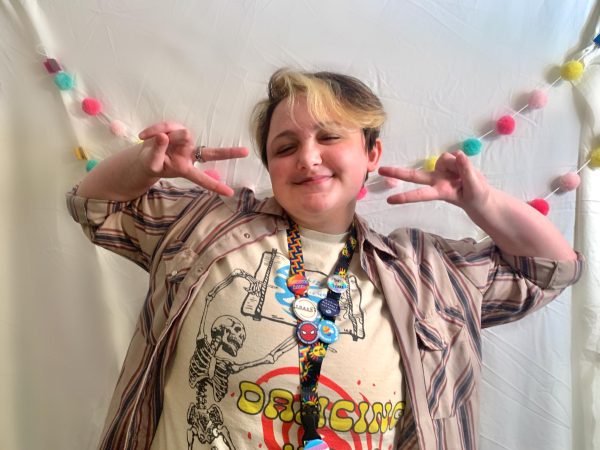
Sh • Mar 26, 2024 at 7:21 pm
I’d love for you to finish this series of articles!